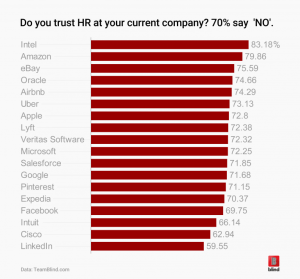Real talk: We’ve been having discussions for literally years now about recruiting getting a “seat at the table.” As far back as 2008, during the doldrums of the Great Recession, an ERE conference keynoter said that adverse economic conditions would give recruiters their long, oft-sought “seat at the table.” That did not happen. If anything, HR and recruiting functions were likely more involved in laying off people than bringing in people.
Now we’re in this supposedly amazing economy, at least in terms of unemployment rate — it fell to a 50-year low last month — and you would think recruiting would again be poised for its big “seat at the table” moment. After all, if we all need A-players, but the A-players are employed elsewhere, shouldn’t recruiters be building relationships, looking for hidden gems (hint: consider people not getting hired because of emergent ageism), and even developing poaching strategies? If people are the lifeblood of a business, a statement that many of us agree with, and recruiters find and bring in those people, why does recruiting still broadly lack this seat at the table?
The Elephant in the Room
Although people on LinkedIn would be quick to scream from the comments section that “HR is not technically recruiting!” (fair enough), the fact is that recruiting almost always resides within HR. And that, dear friend, is the issue.
HR is not broadly respected at most companies.
The Wall Street Journal had a Women in the Workplace conference last month in San Francisco. One presenter asked attendees if they felt comfortable going to HR with issues. Roughly 1 in 4 hands went up. Meanwhile, a study last summer about employees’ views of HR found some unfavorable results. Here’s some of the data:

In a time of rapid innovation and creation, people still often view HR as an outdated compliance function. A comment I’ve seen on LinkedIn sums it up: “HR is a bunch of pearl-clutching ninnes who don’t help the organization.”
That can be argued, of course. I believe HR does help the organization, but in the recruiting sense? Maybe not so much. HR helps protect the company and often senior leaders, but it is not broadly an advocate for employees, despite often claiming to be. And it really doesn’t have much positive impact on the recruiting function.
So what can we do?
Move Recruiting Under Biz Dev
Yes, this would confuse and shock many people, and many acronyms would get disrupted. It would be chaos on internal Slack for a week or two. But hear me out.
Let’s go back to the oft-heard statement, “People are the lifeblood of our business.” True. At this moment, totally true. And though some executives saying that may be racing to automate as many functions as possible, we’re not quite there yet. In the meantime, here are some facts to consider:
Fact No. 1: People are important to the growth of a company (or its consistent stability, which is what many employees want from work).
Fact No. 2: If people are important to helping make products and design marketing campaigns and coordinate logistics that help the business, then people inherently are developing the business.
Fact No. 3: Executives care more and attend more meetings about business development activity than HR activity.
If you take these three facts together, then move your recruiting function under your business development function. Your outcomes should be:
- Executives will care more about and pay more attention to hiring.
- Recruiting will be more empowered.
- Recruiting will lose the “HR stigma.”
- You might even be able to move a bit faster on mission-critical hires, and maybe even have more budget and resources.
- There’s a good chance that metrics will be handled better in biz dev than HR. (HR metrics are messy, albeit evolving.) That would help recruiters see their blind spots.
What do you think? Is this possible? Or too crazy to ever conceivably work?
